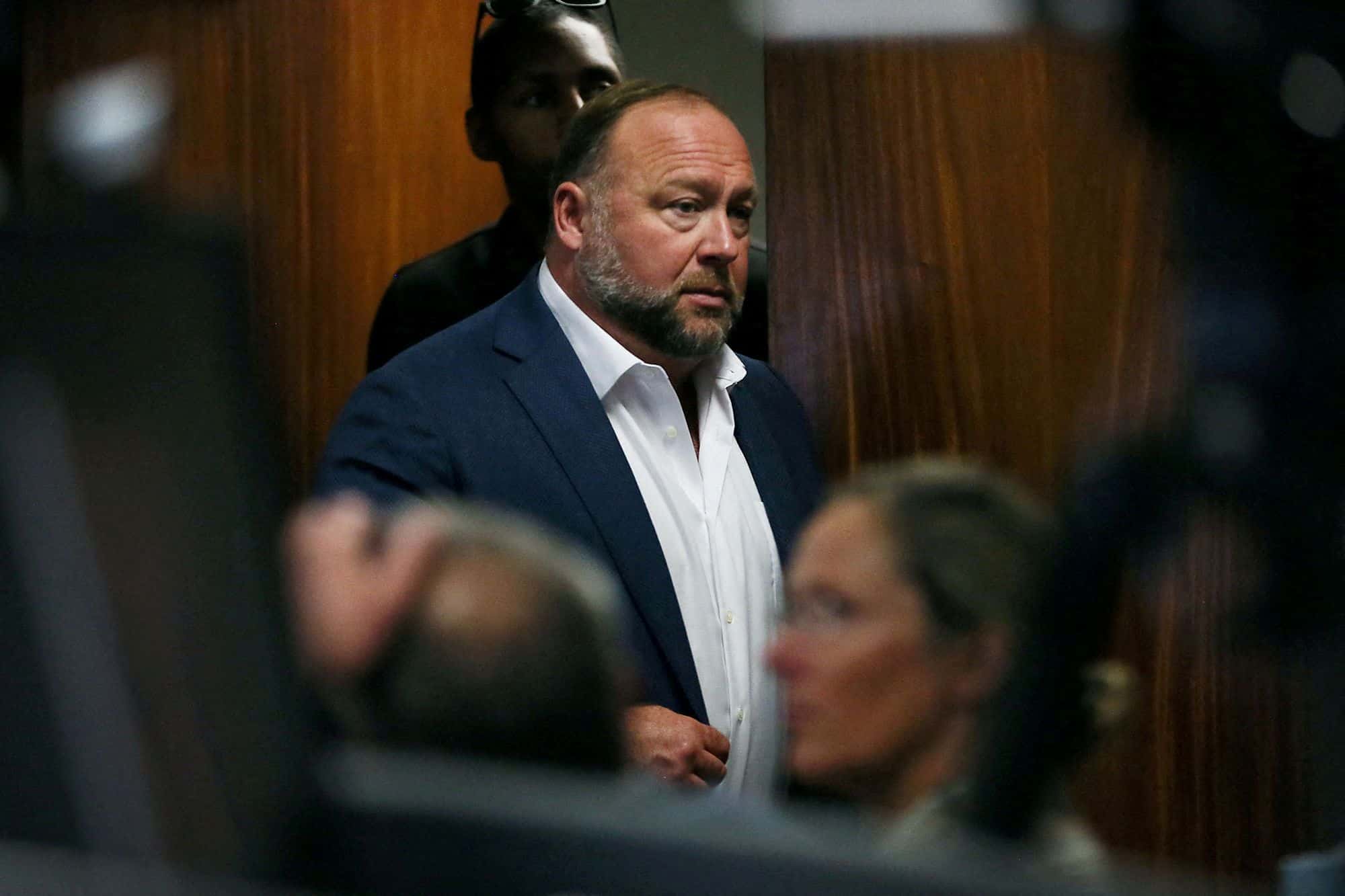News
Alex Jones Ordered to Pay an Additional $472 Million

Alex Jones was ordered to pay $472 million in punitive damages and attorneys’ fees in addition to the $965 million awarded by a Connecticut jury for spreading lies about the Sandy Hook school massacre.
On Thursday, Connecticut state court judge Barbara Bellis ruled that the Infowars host’s actions warranted him paying punitive and compensatory damages to the families of the victims of the 2012 school shooting, which killed 20 first graders and six educators.
She awarded $150 million in punitive damages and $321.7 million in legal fees, which Jones must pay to the victims’ lawyers under a one-third contingency-fee arrangement.
Jones’s lawyer, Norm Pattis, did not immediately respond to a request for comment on Bellis’ rulings.
Alex Jones has promoted the conspiracy theory that the government staged the shooting with “crisis actors” to influence gun-control policy. Jones was found to have defamed the families and violated a state law prohibiting the sale of products with false statements after being sued by five Sandy Hook families and a Federal Bureau of Investigation agent who responded to the shooting.
He frequently pushed vitamin supplements and survival gear on shows where he lied about the shooting.
Alex Jones was found guilty.
On October 12, a jury awarded $965 million in compensatory damages for the victims’ reputational harm and emotional distress. Despite the already-hefty verdict, plaintiffs’ lawyers urged Bellis to award the maximum possible punitive damages to deter Jones from spreading his lies.
Bellis stated that she based her punitive damages award on Jones’s degree of malice and his intentional decisions to conceal his financial resources and continue tormenting the families for profit for a decade, even on shows broadcast during the trial.
“This depravity, as well as the defendants’ cruel, persistent course of conduct, establishes the highest degree of reprehensibility and blameworthiness,” the judge wrote in her 45-page decision.
However, the punitive award was not the most severe that Bellis could have imposed. In her ruling, she stated that legal precedent would have allowed her to impose a punitive damages award equal to double the jury verdict – or nearly a billion – but she also stated that both the US and Connecticut supreme courts discouraged disproportionately large punitive damages awards that could be viewed as a “windfall” to plaintiffs.
On Thursday, a family lawyer, Chris Mattei, praised Bellis’ award. “The court recognized Alex Jones and his business entities’ intentional, malicious, and heinous conduct,” Mattei wrote in an email. “We hope this reinforces the case’s message: those who profit from lies that target the innocent will face justice.”
Alex Jones mocked the jury verdict almost immediately after it was announced, disparaging the massacre and vowing to appeal any court order. He has already requested that Bellis overturn the jury’s decision as legally flawed and order a new trial. The judge has not yet decided on that request.
Fees and punitive damages
Pattis had requested that Bellis award only nominal attorneys’ fees and punitive damages, claiming that the jury’s award was sufficient punishment. However, Pattis acknowledged that it is unclear what amount of damages – would be sufficient to change Jones’ behaviour.
The case is still hung up on whether Jones will pay any portion of the verdict. The families have accused Jones of concealing assets and stealing profits through a network of shell companies controlled by family members.
Bellis granted the families’ request earlier Thursday to temporarily prohibit Jones and his companies from transferring or disposing of assets without her permission. Mattei agreed with the decision.
“This is the first step in ensuring that Jones personally pays every penny he has to the families he has tormented for years,” he said.
The families also requested that Jones provide a complete accounting of his assets, which he has consistently refused to do, and that he bring all movable property to Connecticut for safekeeping by the court. The judge has not yet responded to those requests.
Jones declared Infowars’ parent company, Free Speech Systems LLC, bankrupt this summer and has repeatedly stated that he will never pay the families a dime. He’s asked his millions of followers to donate to him as he continues investigating the shooting and appealing the verdicts against him.
During the Connecticut trial, one of Jones’ executives testified that corporate revenues in the ten years following Sandy Hook ranged between $100 million and $1 billion. A financial expert testified in a previous Sandy Hook defamation trial that Alex Jones’ net worth likely ranges between $135 million and $270 million.
Source: Bloomberg
Keywords: Alex jones sandy hook, the Alex jones show
News
Katie Ledecky Hopes For Clean Races At Paris Olympics In The Aftermath Of The Chinese Doping Scandal

PARIS — Katie Ledecky is looking for clean Olympic races. On Wednesday, Hope had pretty much reached her limit.
The American swimmer hopes to add to her six gold medals as she competes in the 400, 800, and 1,500 meters at the Paris Games. Her program starts with the heavy 400 on Saturday, featuring Ariarne Titmus and Summer McIntosh.

Katie Ledecky | ESPN Image
Katie Ledecky Hopes For Clean Races At Paris Olympics In The Aftermath Of The Chinese Doping Scandal
The 27-year-old Katie is competing in her fourth Summer Olympics, but the first since a doping scandal involving almost two dozen Chinese swimmers who tested positive for a banned chemical before the Tokyo Games — yet were permitted to compete with no consequences. The controversy has raised serious worries regarding the effectiveness of anti-doping initiatives.

Katie Ledecky | Vogue Image
“I hope everyone here is going to be competing clean this week,” Ledecky claimed. “But what truly counts is, were they training cleanly? Hopefully this has been the case. Hopefully, there has been worldwide testing.”
The International Olympic Committee has expressed concern over the ongoing US investigation into possible doping by Chinese swimmers. While awarding the 2034 Winter Olympics to Salt Lake City on Wednesday, the IOC urged Utah officials to do whatever they could to stop the FBI investigation.
“I think everyone’s heard what the athletes think,” Katie added. “They seek transparency. They want more answers to the remaining questions. At this point, we are here to race. We are going to race whoever is in the lane next to us.
“We are not paid to conduct the tests, so we trust those who follow their regulations. That applies both today and in the future.

Katie Ledecky | ESPN Image
Katie Ledecky Hopes For Clean Races At Paris Olympics In The Aftermath Of The Chinese Doping Scandal
SOURCE | AP
News
London Heatwave Alert: High Temperatures Set to Soar to 29C Next Week

As the summer holidays begin, London may experience an official heatwave with temperatures reaching up to 29 degrees Celsius.
The Met Office predicts a long period of sunny and dry weather for London after a soggy spring and summer.
After a cloudy day on Saturday, temperatures are expected to reach 27C on Sunday, with lots of sunlight.
On Monday and Tuesday, temperatures are forecast to peak at 29 degrees Celsius. Monday is forecast to offer more sunlight, while Tuesday may see some gloomy weather.
Temperatures are expected to remain in the high 20s next week, with lows of approximately 18C.
According to the Met Office, a heatwave is “an extended period of hot weather relative to the expected conditions of the area at that time of year, which may be accompanied by high humidity.”
In the United Kingdom, a heatwave is proclaimed when daily temperatures meet or surpass a certain level for at least three consecutive days.
In London, the heatwave threshold is 28 degrees Celsius.
The Met Office reported that the UK is experiencing hotter and wetter weather on average due to climate change.
The UK experienced its warmest May and April on record this year, despite damp and dismal conditions in many areas.
According to the Met Office’s State Of The UK Climate 2023 report published on Thursday, the UK experienced historic levels of extreme weather last year.
In the United Kingdom, 2023 was the second warmest year on record, bringing storms, flooding, strong heatwaves, and rising sea levels; only 2022 was warmer.
It was 0.8°C higher than the average from 1991 to 2020, and 1.66°C higher than the 1961 to 1990 average.
However, 2023 will be a “cool year” in comparison to 2100, based on the planet’s warming trajectory.
The government’s plan to adapt to the hazards presented by climate change is currently being challenged in the High Court by campaigners who allege the Tory administration’s July 2023 National Adaptation Programme (NAP) fails to adequately address 61 concerns.
Source: The Standard
News
Novo Nordisk’s Wegovy is a Heart-Risk-Reducing Product.

(VOR News) – The European Union’s medical regulator has granted approval to Wegovy, a blockbuster weight loss treatment manufactured by Novo Nordisk, in order to expand its application to include the reduction of major heart events in overweight or obese adults.
In order to expand the scope of the medication’s applicability, this authorisation was granted. The purpose of obtaining this approval was to broaden the medicine’s application.
The Danish pharmaceutical company announced on Thursday that the European Medical Agency has formulated a “positive opinion” regarding the label’s expansion.
The agency made this determination after conducting a comprehensive examination of the results of a SELECT study that was subjected to rigorous monitoring. Other applications of the substance are facilitated by this conclusion.
The SELECT experiment, which was financed by Novo Nordisk and published in August 2023.
Wegovy and Ozempic contain semaglutide as the active ingredient.
Reduced the risk of major cardiovascular events by twenty percent when compared to a placebo. The researchers arrived at this conclusion. This realisation was the outcome of the researchers’ investigation.
The notion that the European Medicines Agency label for Wegovy should be amended is a significant step forward for patients who are coping with cardiovascular disease and obesity, according to Martin Holst Lange, executive vice president and director of development at Novo Nordisk.
The company’s statement, which was disclosed, indicated that the recommendation to update the label is a substantial advancement.
It is evident that Wegovy has the potential to save lives by reducing the likelihood of significant adverse cardiovascular events, as evidenced by the findings of the SELECT research. An additional benefit of participating in this exercise is that it helps individuals effectively manage their weight, which is a benefit in and of itself.
The company also stated that the label update incorporates data from the SELECT trial, which showed a 15% reduction in the risk of death from cardiovascular causes and a 19% reduction in the risk of death from any cause when compared to situations in which a placebo was used in conjunction with the product.
The SELECT trial was conducted in the United States, according to the company. Furthermore, the organisation disclosed that the SELECT investigation was conducted in the United States of America.
It is anticipated that the label amendment will be implemented within the next month, as per the statement issued by Novo Nordisk.
Wegovy has also been approved for use in the United States.
Similarly, the UK medical regulator has taken similar actions. The United Kingdom on Tuesday granted its clearance for the use of Wegovy to reduce the risk of significant cardiac difficulties or strokes in adults who are overweight or obese, such as heart attacks or strokes.
The Food and Drug Administration of the United States of America granted sanction for the medicine to be used in specific applications during the month of March.
This resulted in a rise in the number of distinct applications for the highly popular treatment, which coincides with the sector’s increasing level of competition.
On Thursday, Roche, a global pharmaceutical company with its headquarters in Switzerland, announced that its Wegovy competitor weight reduction tablets will be incorporated into a collection of pharmaceuticals designed to mitigate the adverse effects of obesity.
The pharmaceutical collection will encompass a diverse selection of weight loss medications.
The company’s Chief Executive Officer, Thomas Schinecker, conveyed his satisfaction with the exceptional early-stage trial results of the two potential weight-reduction pharmaceuticals that the company is currently developing. In addition, he asserted that these medications demonstrated the “best in disease potential.”
In making this assertion, Schinecker was alluding to the fact that the medications exhibited the “best in disease potential.” He also stated that they will be a part of a more comprehensive portfolio that is intended to set the Swiss company apart from its competitors in the growing obesity therapy market.
This adds insult to injury. This strategy will be implemented in order to distinguish the Swiss company from other businesses in the market.
SOURCE: CNBC
SEE ALSO:
A Strong U.S. GDP Report Boosts Oil, but Asia’s Economic Woes Limit Gains.
Surge in Covid Cases in Greece: Tourists Issued FLiRT Variant Warning
Business Owners Blame the Government’s Economic Incompetence for Rising Inflation.
-
World2 weeks ago
Former President Trump Survives Being Shot at Pennsylvania Rally
-
Tech4 weeks ago
Huawei Launches 5G-A Pioneers Program at MWC Shanghai 2024: Paving the Way for a Connected Future
-
Tech4 weeks ago
ChatGPT Answers Undiscovered Questions and Outperforms Students.
-
Sports4 weeks ago
NBA Draft: Kyle Filipowski Withdraws Unexpectedly From The First Round
-
News4 weeks ago
US Supreme Court Rejects Drug Deal that Protects the Sackler Family
-
Health4 weeks ago
US Health Agency Issues Dengue Virus Infection Warning






















